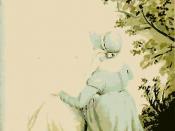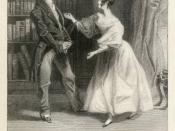In the novel Pride and Prejudice, provincialism plays a major role in establishing our attitudes towards the characters. Upon first impression, it seems that we are meant to consider the city as a highly desirable region while looking upon the country and its inhabitants as inferior. However, just as our first impressions of characters are subject to change, so are our impressions of these territories. I believe that although the novel at face value may seem to glorify the urban life, it praises country habits and ultimately arrives at a compromise between the two.
Our first impressions of the city are given through the appearance of Mr. Bingley's party at the Hertfordshire ball. Through Mr. Darcy's outright snobbery and Bingley's sisters' "air of decided fashion," these urban representatives exude a type of wealth and importance that is not to be found in the country (Austen 12). However, as the story progresses, the "ambassadors" of the city become gradually less admirable.
One of the first instances occurs when the true character of Bingley's sisters is revealed. Bingley's sudden departure that occurs soon afterward is the first of several incidents of good plans and good people being lost to the city. His sister states, "We are...at the same time convinced that when Charles [Bingley] gets to town, he will be in no hurry to leave it again" (Austen 99). From this point forward, lost seems to be the word most connected with the city. When Miss Jane Bennet visits her aunt and uncle in London, her presence is unknown to Bingley. This helpless attitude is magnified tenfold in Lydia's circumstances and reinforced by Mr. Bennet and Elizabeth. "Do you suppose them to be in London? Yes; where else can they be so well concealed?" (Austen 242). Both literally and figuratively,


